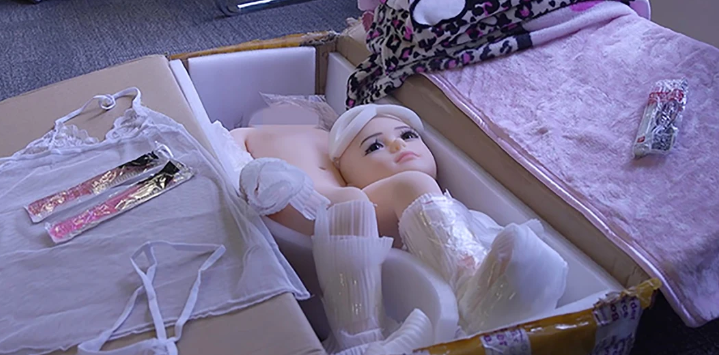Sex dolls can be used in therapy, but with ethical and clinical considerations.
Therapeutic Potential of Sex Dolls
The use of sex dolls in therapy has garnered increasing attention due to their potential psychological and emotional benefits. These dolls, often designed with realistic features, can serve as therapeutic tools in various clinical settings.

Psychological Benefits in Therapy
Sex dolls are being explored for their potential to provide psychological relief to individuals suffering from loneliness, social anxiety, or certain phobias. By offering a form of companionship, these dolls can act as transitional objects, allowing individuals to develop skills and confidence in a controlled environment. The interaction with a sex doll can help in reducing feelings of isolation and improving self-esteem in patients who struggle with interpersonal relationships.
Sex Dolls in Addressing Intimacy Issues
Intimacy issues, often rooted in psychological barriers or past trauma, can be addressed through the use of sex dolls in therapy. These dolls provide a safe space for individuals to explore their feelings and emotions related to intimacy, without the fear of judgment or rejection. By facilitating a controlled and non-threatening environment, therapists can work with patients to overcome barriers to intimacy, enhancing their ability to form healthy relationships in the future.
Role in Treating Sexual Dysfunction
Sexual dysfunction, which can stem from both psychological and physical factors, is another area where sex dolls show promise. In cases where patients are dealing with performance anxiety, negative body image, or other psychological barriers, sex dolls can serve as tools for desensitization and practice. They allow individuals to explore their sexuality in a private setting, which can lead to improvements in their sexual health and overall well-being.
Ethical Considerations in Therapeutic Use
The integration of sex dolls into therapeutic practices raises significant ethical questions. While the potential benefits are notable, it is crucial to navigate the complex ethical landscape carefully to ensure that the use of these tools aligns with the highest standards of clinical practice.
Ethical Implications in Therapy Settings
The primary ethical concern in using sex dolls in therapy is ensuring that their use benefits the patient without causing harm. Therapists must consider the psychological impact of introducing sex dolls into therapy, especially concerning patients’ emotional and sexual health. There is a fine line between using these dolls as therapeutic aids and inadvertently reinforcing unhealthy attitudes or behaviors.
Another ethical consideration is the potential for creating unrealistic expectations about relationships and intimacy. Sex dolls, by their nature, cannot reciprocate emotions or provide the same level of interaction as a human partner. Therapists must guide patients to understand this distinction to prevent any misconceptions that could adversely affect their real-life relationships.
Consent and Autonomy Considerations
Informed consent is a cornerstone of ethical therapy. Patients must be fully aware of the nature and purpose of using sex dolls in therapy. This includes an understanding of what the therapy entails, the potential risks and benefits, and any alternative treatment options available.

Clinical Studies and Research
The exploration of sex dolls in therapeutic settings is an emerging field, with clinical studies and research beginning to shed light on its efficacy and outcomes. This research is crucial in understanding the potential and limitations of sex dolls as therapeutic tools.
Empirical Evidence Supporting Therapeutic Use
Empirical studies on the use of sex dolls in therapy have focused on several key areas:
- Impact on Mental Health: Some studies have shown that sex dolls can provide comfort and reduce feelings of loneliness in individuals with social anxiety or severe introversion.
- Improvement in Sexual Health: Research indicates potential benefits in using sex dolls for individuals experiencing sexual dysfunction, helping them explore sexuality in a non-threatening environment.
- Enhancement of Therapeutic Techniques: Sex dolls have been used as adjuncts in therapy, particularly in exposure therapy for patients with phobias or trauma-related disorders.
The data, however, is still in nascent stages, and more comprehensive studies are required to establish concrete conclusions.
Analysis of Patient Outcomes
Patient outcomes from the use of sex dolls in therapy have been varied, highlighting the importance of personalized approaches:
- Increased Self-esteem and Confidence: Some patients report improved self-esteem and confidence in dealing with interpersonal relationships.
- Variability in Effectiveness: The effectiveness of sex dolls in therapy appears to vary greatly depending on individual patient cases, with some experiencing significant benefits while others see little to no change.
Patient Perspectives and Experiences
The use of sex dolls in therapy, a relatively new practice, has generated a range of responses from patients. Understanding these perspectives is crucial for evaluating the effectiveness and appropriateness of this therapeutic approach.
Personal Testimonies of Therapy Patients
Patients who have used sex dolls in therapy sessions have shared diverse experiences:
- Positive Impacts:
- Many report feelings of comfort and a decrease in loneliness, particularly those who struggle with social interaction.
- Individuals with sexual dysfunctions have found these sessions helpful in exploring their sexuality without pressure or judgment.
- Mixed Reactions:
- Some patients experienced initial discomfort or skepticism about using sex dolls in therapy.
- A few reported no significant change in their condition, indicating the variability in effectiveness.
These testimonies highlight the subjective nature of therapy and the importance of tailoring it to individual needs and preferences.
Impact on Quality of Life and Relationships
The introduction of sex dolls in therapy has shown varying effects on patients’ quality of life and relationships:
- Enhanced Self-Understanding: Patients often gain deeper insights into their emotional and sexual needs, leading to improved self-esteem.
- Influence on Relationships:
- For some, the use of sex dolls has led to a more positive outlook on relationships, helping them develop better interpersonal skills.
- Others have faced challenges in translating these experiences into real-world relationships, emphasizing the need for comprehensive therapy that addresses these translation issues.

Guidelines for Therapeutic Use
Developing guidelines for the therapeutic use of sex dolls is essential to ensure ethical practices, effectiveness, and patient safety. These guidelines encompass clinical protocols, best practices, and professional training requirements.
Clinical Protocols and Best Practices
Creating and following clinical protocols ensures that the use of sex dolls in therapy is both effective and ethical. Key aspects of these protocols include:
- Patient Assessment: Thoroughly evaluate the patient’s psychological state and history to determine if this therapy approach is suitable.
- Informed Consent: Clearly explain the therapy process, potential benefits, and risks to the patient. Obtain explicit consent before proceeding.
- Privacy and Confidentiality: Maintain the highest standards of confidentiality and privacy during therapy sessions.
- Follow-Up and Support: Regularly assess patient progress and provide additional support as needed.
Professional Training and Competence
Professionals using sex dolls in therapeutic settings must possess specific competencies:
- Specialized Training: Therapists should undergo training that specifically addresses the use of sex dolls in therapy, including ethical considerations and techniques.
- Cultural Competence: Understand and respect the diverse cultural backgrounds and beliefs of patients concerning sexuality and therapeutic interventions.
- Ongoing Education: Stay updated with the latest research and developments in the field to ensure the best possible care for patients.